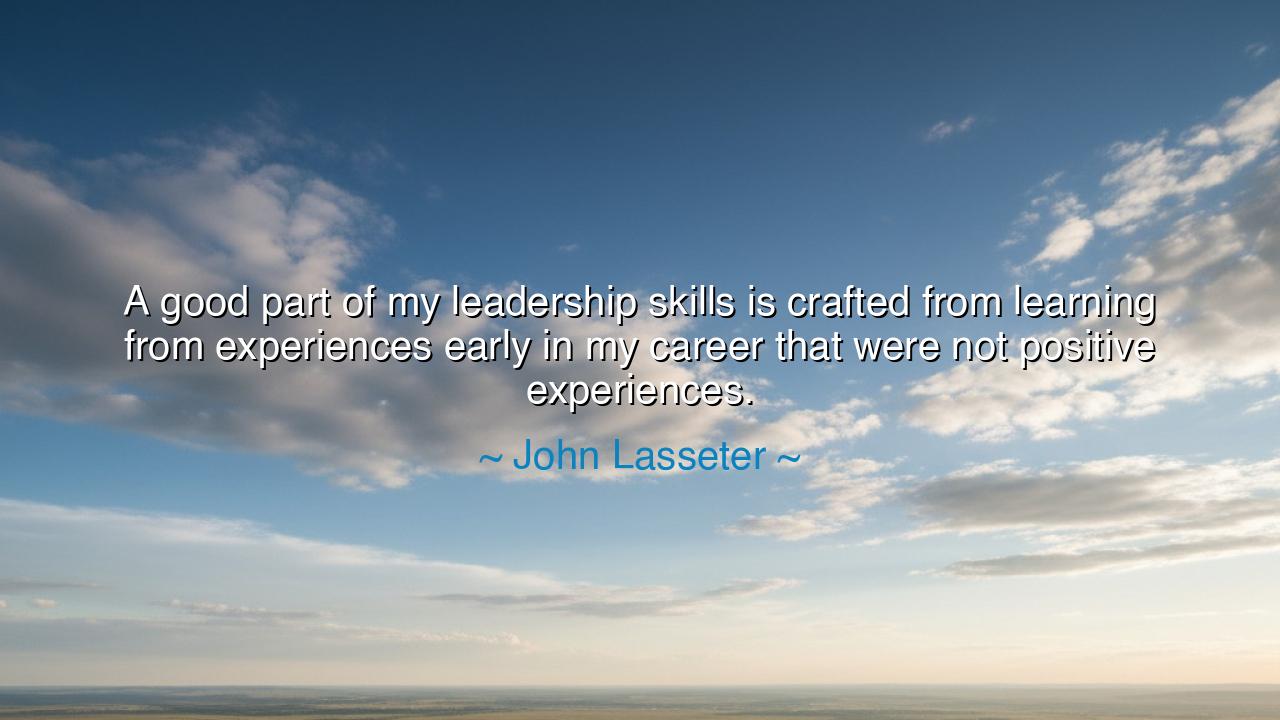
A good part of my leadership skills is crafted from learning from
A good part of my leadership skills is crafted from learning from experiences early in my career that were not positive experiences.






In the words of John Lasseter: “A good part of my leadership skills is crafted from learning from experiences early in my career that were not positive experiences.” These words shine like a torch upon the path of all who strive for wisdom. For greatness is not born from ease, nor are the strongest leaders shaped in times of comfort. It is in trial, in error, in the sting of failure and the weight of disappointment, that the iron of character is heated and hammered into form.
The ancients knew that pain is often the first teacher of wisdom. Did not Odysseus, tossed upon the seas, learn patience, cunning, and endurance from his long years of wandering? His triumph was not given in a moment of peace, but earned through storms, betrayal, and loss. So too does Lasseter remind us that leadership is not crafted in the halls of success alone, but in the crucible of failure—where a person must decide either to crumble or to rise renewed.
Consider the story of Abraham Lincoln. In his youth, he faced defeat after defeat—failed businesses, lost elections, personal grief. To many, such a path would have seemed cursed. Yet from these ashes he forged resilience, humility, and a deep understanding of the suffering of others. These became the very roots of his leadership, enabling him to guide a fractured nation through civil war. What seemed like misfortune became the soil of destiny. So it is with every leader who learns more from their wounds than from their victories.
Lasseter’s words also remind us that negative experiences need not be chains that hold us down. Instead, they may be chisels that carve away arrogance, blindness, or fear. The leader who has tasted humiliation knows how to lift up the fallen. The leader who has endured rejection learns the priceless art of perseverance. Without these early storms, many would sail through life shallow and untested, unable to command respect or to guide others through difficulty.
Yet, let us not mistake this path as easy. To learn from failure requires humility, for many fall into bitterness instead. But those who pause, reflect, and ask: What can this teach me?—these are the ones who turn wounds into wisdom, and scars into maps for others to follow. In this transformation lies the true crafting of leadership skills: to make of one’s own hardships a guiding light for others who stumble in the dark.
The lesson is clear: do not despise your failures. Do not curse your negative experiences. Gather them, study them, let them be your instructors. In them lies a treasury greater than gold: resilience, perspective, and empathy. These are the qualities no textbook can teach, yet they are the very foundation of true leadership.
Therefore, O seeker, embrace even the painful beginnings of your journey. Do not run from the memory of hard days, but cherish them as sacred tutors. For the future will demand of you not perfection, but endurance; not pride, but wisdom; not arrogance, but compassion. As Lasseter teaches, it is in the furnace of early struggles that the strongest steel is tempered. So rise, and let your past become your teacher, your failures your foundation, and your scars the proof of your strength.






AAdministratorAdministrator
Welcome, honored guests. Please leave a comment, we will respond soon